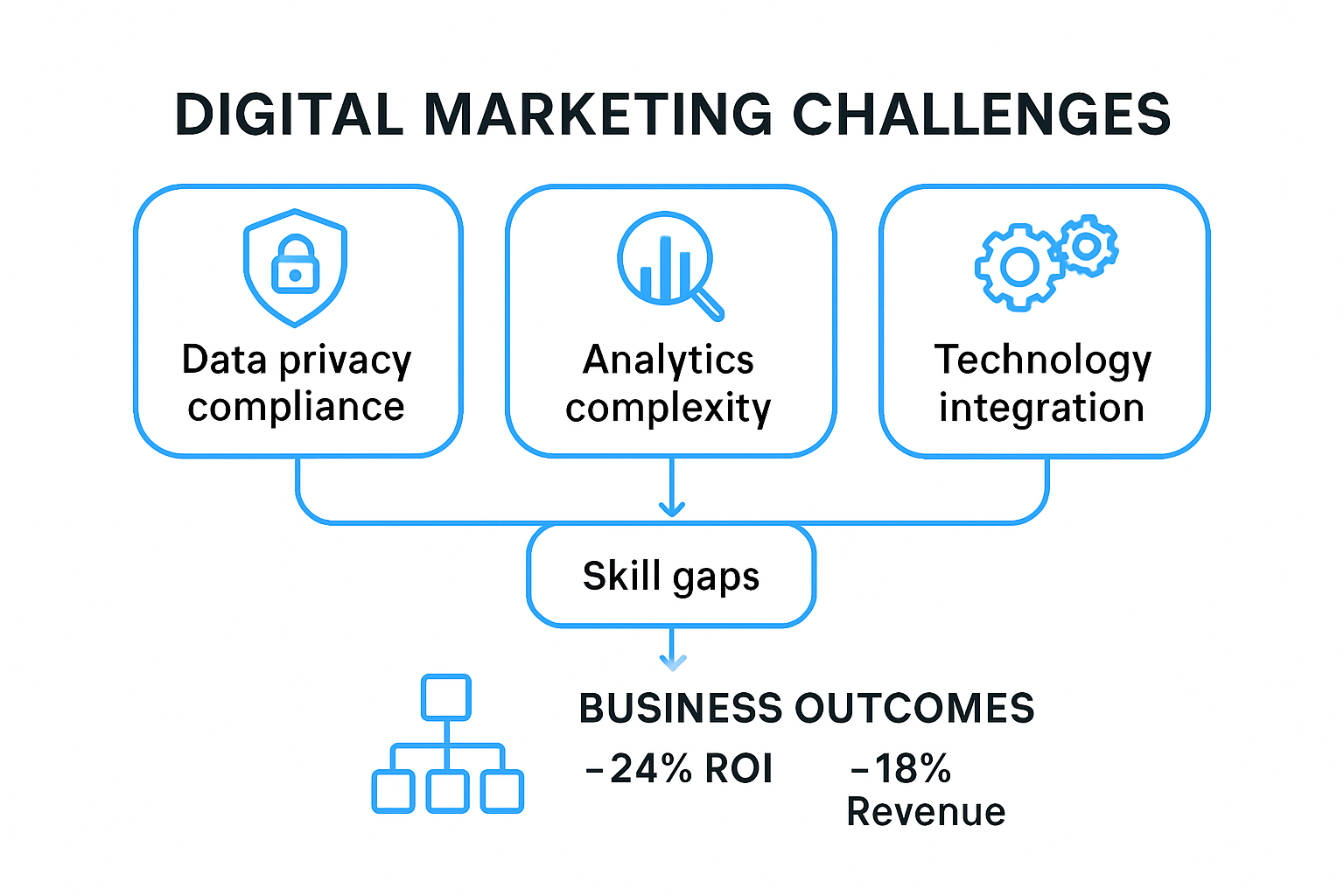Digital marketing is speeding ahead and businesses are scrambling to keep up with all the new rules and technologies. Shockingly, more than 60 percent of marketers admit they struggle to keep pace with fast-changing data privacy laws and technology upgrades. It sounds like success is all about mastering fancy tech, but the real winners are actually the ones who get the basics right and know how to turn these challenges into real-world trust and lasting connections.
Table of Contents
- Common Obstacles In Digital Marketing Campaigns
- Impact Of Technology And Data Privacy
- Strategies To Overcome Digital Marketing Challenges
- Future Trends Facing Digital Marketers Worldwide
Quick Summary
| Takeaway | Explanation |
|---|---|
| Prioritise data privacy compliance | Businesses must adopt robust data protection strategies to adhere to regulations and protect consumer trust. |
| Embrace data-driven decision-making | Utilize advanced analytics for deeper insights beyond surface-level metrics to enhance marketing effectiveness. |
| Invest in technology integration and skills | Continuous training and adaptive strategies are vital for effectively leveraging new digital marketing tools. |
| Focus on ethical data practices | Building trust through transparent data handling and consumer engagement is essential in the modern marketing landscape. |
| Anticipate future digital trends | Stay ahead by integrating AI, voice search, and immersive technologies into marketing strategies for competitive advantage. |
Common Obstacles in Digital Marketing Campaigns
To help businesses understand and address the most common obstacles in digital marketing campaigns, the table below summarises each challenge alongside their specific examples and key requirements.
| Challenge | Example Requirements/Aspects |
|---|---|
| Data Privacy & Compliance Complexities | Transparent data collection, explicit user consent, secure data storage, regular privacy audits |
| Performance Measurement Challenges | Advanced analytics interpretation, multi-channel tracking, predictive modelling, real-time adjustment |
| Technology Integration & Skill Gaps | Continuous training, technology adoption strategies, cross-functional literacy, agile learning environments |
Digital marketing continues to evolve rapidly, presenting businesses with a complex landscape of challenges that demand strategic navigation. While technology offers unprecedented opportunities, organisations face significant hurdles in effectively executing their digital marketing strategies.
Data Privacy and Compliance Complexities
In the current digital ecosystem, data privacy has become a critical concern for marketers. Learn more about strategic digital marketing approaches that address these challenges. According to Forbes Business Council, businesses face increasingly stringent regulations that require meticulous attention to data handling practices.
The regulatory landscape is transforming how companies collect, store, and utilise customer information. Regulations like GDPR and CCPA impose strict guidelines that demand comprehensive compliance strategies. Businesses must invest in robust data protection mechanisms, ensuring:
- Transparent data collection processes
- Explicit user consent mechanisms
- Secure data storage and management systems
- Regular privacy audits and compliance checks
Failure to adhere to these regulations can result in substantial financial penalties and significant reputation damage. Companies must develop a proactive approach to data privacy that goes beyond mere compliance, creating a culture of respect for user information.
Performance Measurement and Data Interpretation Challenges
Another substantial obstacle in digital marketing campaigns is the ability to accurately measure and interpret performance data. Research from the American Marketing Association highlights that many businesses struggle with moving beyond surface-level metrics to gain meaningful insights.
Traditional approaches of relying on intuition or superficial analytics are no longer sufficient. Modern digital marketing demands a sophisticated understanding of complex data sets. Marketers must develop advanced skills in:
- Advanced analytics interpretation
- Multi-channel performance tracking
- Predictive data modelling
- Real-time campaign adjustment
The complexity lies not just in collecting data, but in transforming raw information into actionable strategic insights. This requires significant investment in both technological infrastructure and human expertise.
Technology Integration and Skill Gaps
Digital marketing campaigns increasingly depend on intricate technological ecosystems. The rapid pace of technological evolution creates significant challenges for organisations attempting to maintain competitive digital strategies. Businesses must continuously adapt to emerging platforms, tools, and communication channels.
The skills gap represents a critical bottleneck. Many organisations struggle to recruit and retain professionals who can effectively leverage advanced marketing technologies. This challenge encompasses:
- Continuous skills training
- Technology adoption strategies
- Cross-functional technological literacy
- Agile learning environments
Successful digital marketing in 2025 requires a holistic approach that integrates technological proficiency, strategic thinking, and adaptive capabilities. Companies must view digital marketing not as a standalone function, but as a core strategic component of their overall business approach.

Impact of Technology and Data Privacy
The intersection of technology and data privacy represents a critical frontier for businesses navigating the complex digital marketing landscape. As technological capabilities expand, the fundamental relationship between organisations and consumer data undergoes profound transformation.
Technological Disruption and Privacy Frameworks
Digital technologies are fundamentally reshaping how businesses collect, analyse, and utilise consumer information. Explore our strategic digital marketing insights to understand these emerging dynamics. According to Gartner Research, emerging technologies are creating unprecedented challenges in maintaining consumer trust and regulatory compliance.
Advanced technologies like artificial intelligence, machine learning, and big data analytics are pushing the boundaries of data collection and interpretation. These technologies offer remarkable insights but simultaneously raise significant ethical and legal questions. Organisations must develop sophisticated approaches that balance technological innovation with robust privacy protections.
Key technological considerations include:
- AI-driven data analysis capabilities
- Automated consent management systems
- Real-time privacy compliance mechanisms
- Transparent data processing protocols
The technological landscape demands a proactive approach where privacy is not an afterthought but a fundamental design principle. Companies must integrate privacy considerations into their technological infrastructure from the ground up.
Consumer Trust and Ethical Data Utilisation
Consumer expectations around data privacy have dramatically evolved. Research from the International Association of Privacy Professionals indicates that modern consumers are increasingly sophisticated in understanding their digital rights and demanding greater transparency.
Organisations must recognise that data privacy is not merely a legal requirement but a critical component of brand reputation and customer relationship management. Ethical data practices have become a significant competitive differentiator. Businesses that demonstrate genuine commitment to protecting consumer information can build deeper, more meaningful connections with their audience.
Strategic approaches to maintaining consumer trust involve:
- Comprehensive data protection strategies
- Clear communication about data usage
- User-controlled privacy settings
- Regular independent privacy audits
Regulatory Complexity and Global Compliance
The global regulatory environment surrounding data privacy continues to become increasingly complex and multifaceted. Different jurisdictions are implementing progressively stringent regulations that require nuanced, adaptive compliance strategies.
Businesses must develop comprehensive frameworks that can accommodate diverse and sometimes conflicting regulatory requirements across different regions. This demands not just legal expertise but also sophisticated technological infrastructure capable of implementing granular privacy controls.
Companies must focus on:
- Cross-jurisdictional compliance mechanisms
- Adaptive privacy policy frameworks
- Automated compliance monitoring
- Scalable privacy technology solutions
Successful navigation of this complex landscape requires a holistic approach that integrates legal expertise, technological capability, and a genuine commitment to ethical data practices. Digital marketing in 2025 will be defined not just by technological innovation, but by an organisation’s ability to build trust through responsible data stewardship.
Strategies to Overcome Digital Marketing Challenges
Businesses navigating the complex digital marketing landscape must develop comprehensive, adaptive strategies that address emerging technological and regulatory challenges. Successful organisations recognise that overcoming digital marketing obstacles requires a multifaceted, proactive approach.
Data-Driven Decision Making and Analytics
Explore our guide to effective digital marketing channels to understand strategic implementation. According to the American Marketing Association, data-driven decision-making is crucial for modern digital marketing success.
Companies must move beyond superficial metrics and develop sophisticated analytics capabilities that provide actionable insights. This involves:
- Advanced performance tracking mechanisms
- Comprehensive audience segmentation
- Predictive analytics tools
- Real-time campaign optimization
Effective data utilisation requires investing in both technological infrastructure and human expertise. Marketing teams must develop skills in interpreting complex data sets, understanding statistical significance, and translating insights into strategic actions.
Technological Integration and Skill Development
Forbes Business Council emphasises the critical role of artificial intelligence in transforming digital marketing strategies. Successful organisations must create comprehensive technological integration strategies that go beyond mere tool adoption.
Key considerations for technological integration include:
- Continuous skills training programs
- Cross-functional technological literacy
- Adaptive learning environments
- Strategic technology roadmapping
Businesses must view technological integration as an ongoing process, not a one-time implementation. This requires developing flexible organisational structures that can quickly adapt to emerging technologies and market shifts.
Holistic Privacy and Compliance Frameworks
Navigating the complex regulatory landscape demands a proactive, comprehensive approach to data privacy and compliance. Organisations must develop frameworks that are both legally robust and technologically sophisticated.
Strategic compliance approaches should focus on:
- Automated compliance monitoring systems
- Transparent data processing protocols
- User-controlled privacy settings
- Regular independent privacy audits
Successful digital marketing in 2025 requires more than technological capability. It demands a fundamental reimagining of how businesses interact with consumer data. Companies must develop strategies that prioritise consumer trust, ethical data utilisation, and genuine value creation.
Ultimately, overcoming digital marketing challenges is not about implementing individual solutions but creating an adaptive, integrated approach that combines technological innovation, strategic thinking, and a genuine commitment to consumer needs. Businesses that can successfully balance these elements will be best positioned to thrive in the rapidly evolving digital marketing ecosystem.
Future Trends Facing Digital Marketers Worldwide
Digital marketers must adapt to evolving trends that will shape 2025 and beyond. The following table outlines major future trends, with focus areas and their required strategies as discussed in the article.
| Trend | Focus Area | Required Strategies |
|---|---|---|
| Artificial Intelligence | Predictive marketing, personalisation | Machine learning, intelligent chatbots, content automation |
| Immersive Technologies | AR/VR brand experiences | Virtual demos, interactive storytelling, lifelike engagement |
| Voice Search & Conversational | Natural language-driven interactions | Speech optimisation, conversational content, schema markup |
| Ethical Data Use | Trust & privacy | Transparent consent, first-party data, privacy-first marketing |
The digital marketing landscape is undergoing unprecedented transformation, driven by technological innovation, changing consumer behaviours, and evolving regulatory frameworks. Marketers must anticipate and adapt to emerging trends that will reshape how businesses connect with their audiences.
Artificial Intelligence and Immersive Technologies
Discover cutting-edge digital marketing strategies that leverage emerging technologies. According to Forbes Agency Council, artificial intelligence and immersive technologies are set to revolutionise digital marketing approaches.
Artificial intelligence is transforming marketing from a reactive to a predictive discipline. Key developments include:
- Advanced machine learning algorithms for customer segmentation
- Intelligent chatbot interactions
- Predictive content generation
- Hyper-personalised marketing experiences
Augmented reality (AR) and virtual reality (VR) are creating unprecedented opportunities for immersive brand experiences. Marketers can now offer virtual product demonstrations, interactive brand storytelling, and lifelike consumer engagement that transcends traditional digital boundaries.
Voice Search and Conversational Marketing
Research from Forbes Business Council highlights the growing significance of voice search and conversational marketing technologies. The proliferation of smart speakers and AI voice assistants is fundamentally changing how consumers interact with digital content.
Successful digital marketing strategies must now incorporate:
- Natural language optimization
- Conversational content strategies
- Long-tail keyword adaptation
- Voice search-friendly schema markup
Marketers must develop content that mimics natural speech patterns, focusing on providing direct, conversational answers to user queries. This requires a deep understanding of user intent and the ability to create flexible, context-aware content.
Ethical Data Use and Consumer Trust
The future of digital marketing is intrinsically linked to building and maintaining consumer trust through ethical data practices. Research from ResearchGate emphasises the critical importance of transparent data handling and consumer privacy.
Organisations must prioritise:
- First-party data collection strategies
- Transparent consent mechanisms
- Interactive data engagement
- Privacy-first marketing approaches
Successful digital marketers will view data not as a commodity to be harvested, but as a collaborative relationship with consumers. This means creating value through personalization while maintaining strict ethical standards and giving users unprecedented control over their personal information.

The digital marketing landscape of 2025 demands more than technological proficiency. It requires a holistic approach that balances innovation, consumer trust, and strategic adaptability. Businesses that can navigate these complex dynamics will not just survive but thrive in an increasingly competitive digital ecosystem.
Frequently Asked Questions
What are the key challenges businesses face in digital marketing in 2025?
Digital marketing challenges for businesses in 2025 include data privacy and compliance complexities, performance measurement and data interpretation difficulties, and technology integration and skill gaps.
How can businesses ensure compliance with data privacy regulations?
Businesses can ensure compliance by implementing transparent data collection processes, obtaining explicit user consent, securing data management systems, and conducting regular privacy audits.
Why is data-driven decision-making important in digital marketing?
Data-driven decision-making is essential as it enables businesses to gain actionable insights from complex data sets, optimize campaign strategies, and improve overall marketing effectiveness by moving beyond superficial metrics.
What strategies can help businesses overcome technology integration challenges?
To overcome technology integration challenges, businesses should focus on continuous skills training, create cross-functional technological literacy, and develop adaptive learning environments to better leverage advanced marketing tools.
Ready to Tackle Digital Marketing Challenges in 2025?
If the shifting landscape of data privacy, analytics complexity, and skill shortages are slowing your digital growth, you are not alone. Many businesses are feeling overwhelmed by privacy compliance and technology upgrades while struggling to build genuine consumer trust. These pain points, explored in our article, underscore how crucial it is to find reliable partners who combine technical innovation with a deep understanding of digital marketing basics.
Turn uncertainty into opportunity by working with specialists who can help you navigate every stage of digital transformation. Empower your team with custom web solutions and strategic digital know-how designed for South African businesses.
Act now and give your business an edge. Request a personalised strategy and quotation with our web development experts or learn more about the full range of services at Cloudfusion. Position your company to thrive in the 2025 digital landscape.








